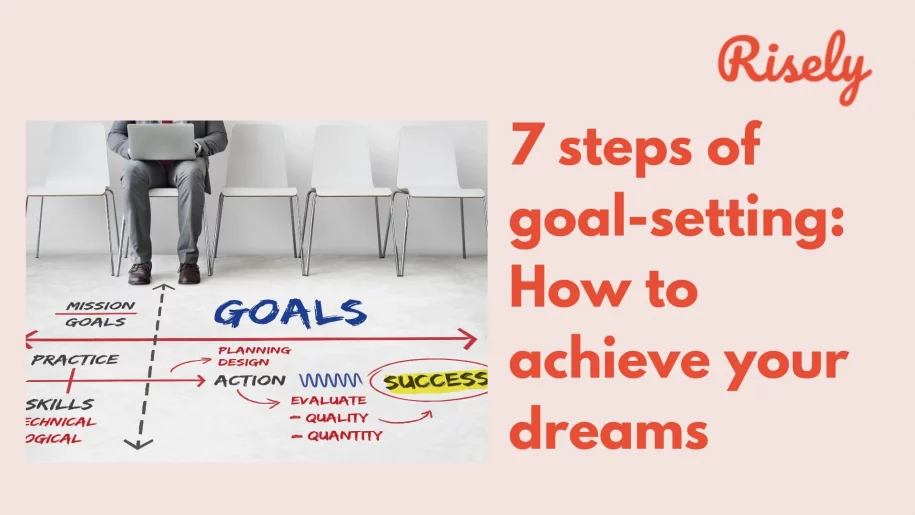7 steps of goal-setting: How to achieve your dreams
Are you tired of feeling like you’re not making progress toward your goals? Do you need help staying motivated or wondering where to start? Goal-setting is a powerful tool that can help you achieve your dreams and aspirations, whether in your personal or professional life. Setting goals provides direction, motivation, and a sense of purpose. It helps you focus on what’s important, identify potential obstacles, and develop a plan of action to overcome them. In this blog post, we’ll explore the benefits of goal-setting and provide practical tips on how to set and achieve your goals. Whether you want to advance your career or pursue a personal passion, effective goal-setting can help you get there. So let’s discover the power of effective goal-setting together.What is goal-setting?
Goal-setting is identifying and defining specific objectives or outcomes you want to achieve in the future. It involves creating an action plan outlining the steps needed to reach those goals. Effective goal-setting involves setting clear, measurable, and achievable targets within a specific timeframe. This process helps individuals and organizations to focus their efforts and resources toward achieving their desired outcomes. Effective goal-setting can be applied in various areas of life, such as personal development, career growth, health and fitness, and education. By setting clear goals, you can establish direction, motivation, and a sense of purpose, which can help you to overcome obstacles and stay on track toward achieving your desired outcomes.Why is goal-setting important?
- Provides direction and focus: Setting clear and specific goals helps individuals and organizations to identify what they want to achieve and focus their efforts and resources toward achieving those goals.
- Increases motivation: Setting challenging goals can increase motivation, as individuals are more likely to be engaged and invested in achieving a personally meaningful and challenging goal.
- Encourages accountability: Effective goal-setting provides a clear benchmark for measuring progress, which can help to hold individuals and organizations accountable for their actions and outcomes.
- Facilitates planning and decision-making: Setting goals helps individuals and organizations develop a plan of action and make decisions aligned with their objectives.
- Improves performance: Research has shown that individuals who set goals tend to perform better than those who do not set goals, as effective goal-setting provides a sense of direction, focus, and motivation.
Other Interesting Reads
Benefits of goal-setting
- Clarity and Focus: Setting specific and achievable goals provides clarity and focus on what you want to achieve. It helps to prioritize tasks and directs attention towards the most important activities that lead to the desired outcomes.
- Better Time Management: Effective goal-setting encourages planning and prioritizing, which helps to manage time more effectively. This results in greater productivity and efficiency, leading to more accomplishments and success.
- Higher Self-esteem: Achieving goals increases self-esteem and confidence, providing a sense of accomplishment and satisfaction. It reinforces a positive self-image and encourages individuals to set and achieve more challenging goals in the future.
- Greater Resilience: Setting and achieving goals requires perseverance and resilience, which strengthens the ability to overcome obstacles and bounce back from setbacks. This helps individuals develop greater resilience and adaptability, which are essential for success in a rapidly changing environment.
- Improved Communication: Effective goal-setting can facilitate better communication and collaboration among team members. It provides a shared understanding of the desired outcomes, roles, and responsibilities, which helps to align efforts toward achieving the common goal.
Challenges of goal-setting
- Unrealistic Expectations: Setting unrealistic or overly ambitious goals can lead to frustration and disappointment if they are not achieved. It is important to set goals that are challenging but achievable and to have a plan in place to achieve them.
- Lack of Clarity: Setting vague or unclear goals can lead to confusion and lack of direction. It is important to set specific and measurable goals that provide a clear target and focus on what needs to be achieved.
- Lack of Commitment: Setting goals without a strong commitment to achieving them can lead to procrastination and lack of progress. Setting goals that are personally meaningful and aligned with values and interests is important to increase motivation and commitment.
- Inflexibility: Setting rigid goals that do not allow adjustments or changes can lead to frustration and a lack of adaptability. It is important to have flexibility in effective goal-setting to adjust to changing circumstances or new information.
- Overemphasis on Outcome: Setting goals that focus solely on the desired outcome without considering the process or journey can lead to burnout and lack of enjoyment. It is important to set goals that focus on the process, journey, and outcome to maintain motivation and engagement.
7 steps of goal-setting
- Decide your goals/objectives: Determine what you want to achieve and why. Set clear, specific, measurable goals aligning with your values and priorities.
- Write down your goal: Write your goal down on paper or in a digital format. This will help you clarify your thoughts and make your goal more tangible.
- Set a deadline: Establish a realistic deadline for achieving your goal. This will help you stay focused and motivated and progress toward your goal within a defined timeframe.
- List all activities needed to achieve the goal: Break your goal down into smaller, manageable steps or milestones. This will help you stay focused, track your progress, and celebrate your achievements.
- Organize your goals into a plan by priority and sequence: Organize your list of activities into a plan that outlines the importance and sequence of tasks needed to achieve your goal.
- Take action immediately: Start taking action on your plan as soon as possible. This will help you build momentum and make progress toward your goal.
- Use every day to do something toward achieving your goal: Set aside time each day to work on tasks that will bring you closer to achieving your goal. Consistency is critical to achieving success.
SMART goal-setting
SMART is a mnemonic acronym for Specific, Measurable, Achievable, Relevant, and Time-bound. It is a popular framework for setting clear, focused, and actionable goals. Here’s a breakdown of each component of SMART goal-setting:- Specific: Your goal should be clear and specific. Avoid setting vague or general goals. Instead, identify precisely what you want to achieve, why you want to achieve it, and what steps you need to take to get there.
- Measurable: Your goal should be measurable. This means that you should be able to track your progress and measure your success. Determine how you will measure progress towards your goal and set targets to keep yourself on track.
- Achievable: Your goal should be achievable. While it’s important to set challenging goals, they should still be attainable. Consider the resources, skills, and time needed to achieve your goal, and make sure it’s realistic.
- Relevant: Your goal should reflect your values, priorities, and long-term aspirations. Ensure that your goal is aligned with your overall objectives and will have a meaningful impact on your life or work.
- Time-bound: Your goal should have a specific deadline or timeframe for completion. This will help you stay focused and motivated and progress toward your goal within a defined timeframe.
Conclusion
Goal-setting is a powerful tool to help you achieve your dreams and aspirations. Setting clear, specific, measurable, achievable, relevant, and time-bound goals allows you to stay motivated and focused on what’s important. Remember to break down your goals into actionable steps, identify potential obstacles, and measure your progress. Whether starting a new project, pursuing a personal passion, or advancing your career, effective goal-setting is key to success. By using the pros and cons we’ve shared in this blog post, you can confidently set and achieve your goals. So what are you waiting for? Start developing your goals today and see the amazing results of pursuing your dreams!Is your goal-setting process helping you win?
Discover insights on your goal-setting skills with Risely’s free assessment for managers
Other Related Blogs
How to Set Effective Learning and Development Goals?
This blog highlights how effective learning and development goals are set, why is setting them important for your organization and what challenges you might face during this process. … Read…
Are you on track to meet your Q1 goals?
Are you on track to meet your Q1 goals? We are in the middle of the first quarter of 2024. Seems hard to believe. It surely is! ⏰ Time has…
5 Secrets Of Solid Goal Setting At Work You Can’t Miss
5 Secrets Of Solid Goal Setting At Work You Can’t Miss “I don’t focus on what I’m up against. I focus on my goals and I try to ignore the…
Understanding the world of Goal Setting Coach to reach new heights
Understanding the world of Goal Setting Coach to reach new heights Setting and achieving goals is essential for personal and organizational success in today’s fast-paced and competitive work environment. However,…


